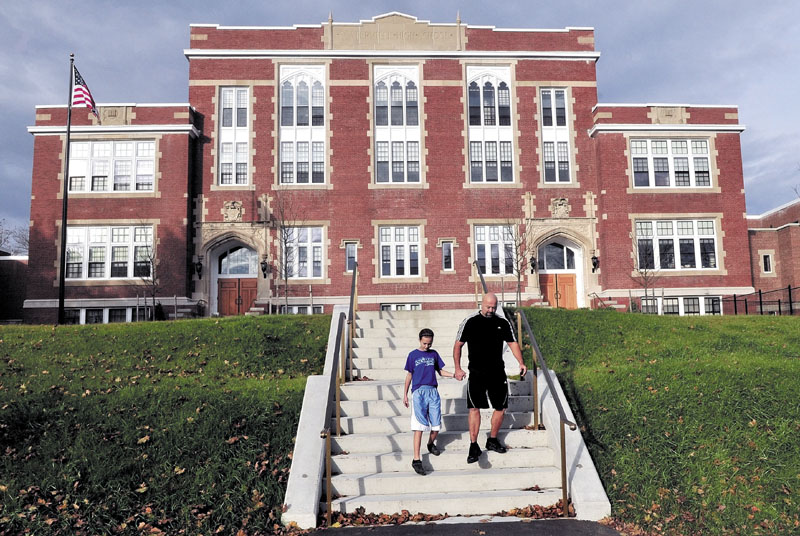AUGUSTA — New members of Maine State Housing Authority’s board criticized the agency’s staff Tuesday, saying costly developments were approved for affordable housing and some priorities need to be re-evaluated.
“If our mission is to provide as much affordable housing as possible to people in need in the state of Maine, then the cost of building those units is absolutely critical to meeting our objective,” said State Treasurer Bruce Poliquin, a commissioner on the board who has drawn attention to the issue. “I agree with (board chair) Peter (Anastos) that Maine State Housing has failed miserably in controlling costs.”
The Board of Commissioners for the agency, also known as MaineHousing, spent about 90 minutes at Tuesday’s meeting discussing the Elm Terrace project in Portland and efforts to contain costs for affordable-housing developments.
Some members said MaineHousing needs to focus on its core mission of maximizing resources to provide affordable housing and to separate that mission from other goals such as historic preservation or promoting green energy.
They said the high cost of renovating historic buildings has driven up budgets for some recent projects, including the 35-unit Gilman Place in Waterville, a former high school with a per-unit cost of $292,312.
MaineHousing Executive Director Dale McCormick said the agency has instituted several cost controls since she took over in 2005 and that some of Poliquin’s statements about MaineHousing’s work are untrue or misleading.
“There’s a lot of heat and not too much light here,” she said.
McCormick said she has demanded that Elm Terrace’s developer, Community Housing of Maine, reduce the development’s proposed cost from $314,000 per unit to $265,000 per unit. Community Housing of Maine’s response will go before MaineHousing’s loan committee soon.
Officials with Community Housing of Maine said they can outline seven ways to bring down the cost of Elm Terrace — a 35-unit development on High Street in Portland. MaineHousing spokeswoman Deborah Turcotte referred questions about the details to the developer. Community Housing of Maine Executive Director Cullen Ryan did not return messages on Tuesday.
MaineHousing funnels state, federal and private money to developers of affordable housing. Not including Elm Terrace, four developments in the past three years have exceeded $270,000 in per-unit costs, according to MaineHousing.
MaineHousing Commissioner Lincoln Merrill Jr. said that doesn’t pass the “straight face test” when his daughter and his employees at Patriot Insurance in Yarmouth are struggling and pay taxes to support such projects.
“When you talk to these folks and say that we’re building subsidized housing projects … that are better than the places they’re living in, I have a real hard time with that,” he said.
Merrill suggested moving people into houses that are vacant would be more cost-effective than building new or renovating buildings.
MaineHousing awards more points for projects that are in downtown areas and that have amenities nearby, but Poliquin said the agency should focus on putting developments on bus lines or outside cities.
“We all know there’s a lot of rural poverty in Maine,” he said. “It would be wise for our board to embrace affordable housing in parts of the state other than downtown areas.”
Anastos, the board’s chair, said MaineHousing has put too much emphasis on social and green-energy policy. The scoring process for applications should award points for lower-cost projects and deduct them for high-cost projects, he said.
McCormick addressed some criticisms of MaineHousing, saying that the developers they choose have never been required to pay union wages and that they are no longer required to install solar water heaters. An incentive to provide health insurance to construction workers also has been eliminated, she said.
She said that comparisons of multi-family developments to single-family home prices are misleading. Multi-family units have to meet higher standards including pre-funding major capitol repairs, installation fire sprinklers and elevators and handicapped accessibility.
MaineHousing has reduced the cost of new construction projects since 2006, McCormick said.
In addition, the use of the state historic tax credit, in place since 2008, reduces the amount of MaineHousing funding for historic rehabilitation projects below the cost for new construction, she said.
Board members, including Poliquin and Don Capoldo, questioned the use of historic properties for affordable housing, but board member Sheryl Gregory spoke in favor of the practice.
A comparison of the $180,078-per-unit Sullivan School project in Berwick and the $272,012-per-unit Park Street School project in Kennebunk shows that developments in historic buidings don’t necessarily cost a lot, Gregory said.
Finding new uses for those buildings benefits their neighborhoods, she said, and tenants benefit from having access to shopping and medical facilities in the community.
“You can build a ticky-tacky building out in the hinterlands for next to nothing,” Gregory said. “Will it be there in 20 years? I don’t know. It depends on how strong the wind is on a given day.”
Susan McMillan — 621-5645
smcmillan@mainetoday.com
Send questions/comments to the editors.




Comments are no longer available on this story